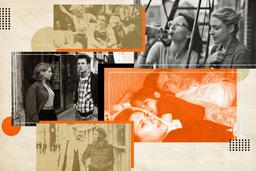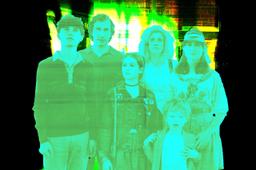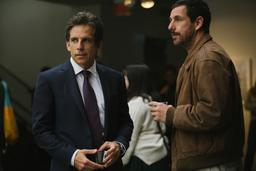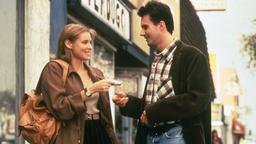The title character of Noah Baumbach’s Jay Kelly is a movie star who looks and acts an awful lot like George Clooney. He’s got the crinkly eyes, the silver-fox coif, the world-weary gravitas embedded in a wolfish grin. Like Clooney, Jay has been acclaimed and, to some extent, accused for simply wringing out variations on the same alpha-male persona, over and over again. When we see a highlight reel of his greatest performances, it includes clips from Ocean’s Eleven, Out of Sight, and The Thin Red Line. Sadly, there’s nothing from Batman & Robin—an omission that’s probably for the best for both Jay Kelly and George Clooney. But it’s also a missed opportunity for a movie determined to blur certain lines between invented and authentic celebrity to score a genuine belly laugh, something to mix up the otherwise steady trickle of knowing, mirthless chuckles.
That reluctance to truly go for broke—to punctuate a pressurized but airless metafictional universe that’s been tailored like an award-ceremony tuxedo to its leading man’s elegant physique and real-life body of work—is emblematic of the movie as a whole. Jay Kelly isn’t bad by any means; Baumbach is, as ever, a clever filmmaker, better than most at dramatizing the tetchiness of artistic types and conjuring up lived-in showbiz textures. The movie ventures behind the scenes of Hollywood movie- and dealmaking with confidence; it joins While We’re Young and The Meyerowitz Stories on the short list of films featuring credible artist retrospectives. The script, by Baumbach and Emily Mortimer, draws on Ingmar Bergman’s Wild Strawberries to dramatize the angst of an aging A-lister whose linear journey from point A (a recently wrapped prestige production in Los Angeles) to point B (a lifetime achievement ceremony in Tuscany) is punctuated by daydreamy flashbacks to his salad days and myriad personal failures.
The references in Jay Kelly to Bergman’s bittersweet classic, and such other iconic portrait-of-the-artist phantasmagorias as 8½ and All That Jazz, are scrupulously controlled and intelligent, yoked to Baumbach’s perennial fascination with and aspirational relationship to the canon. The problem is that Baumbach’s filmmaking here is so controlled and intelligent—as opposed to the wild swing and a miss of White Noise—that it almost cancels itself out. There’s something machine-tooled about the pathos in Jay Kelly, which unfolds, absorbingly but predictably, as a slick gloss on human mess lubricated by what might be crocodile tears for the anguish of a front-runner who’s too rich and famous for his own—or anybody else’s—good.
It’s a character type that Clooney has played before, and the familiarity of seeing him as a stand-in for a strain of anxious but elegant existential malaise—a vibe he cultivated persuasively in movies like Michael Clayton, Up in the Air, and The Descendants—is surely part of the joke. Such deliberateness doesn’t obviate the fact that the actor is better at outright clowning than sad-sack melancholy; he’s never more dashing or attractive than when playing out-and-out morons (his specialty when working with the Coen brothers) and never more susceptible to vanity than when trying to convey relatable, everyday flaws. Baumbach and Mortimer work to give Jay some serrated edges that Clooney can smooth without fully blunting. We can see the practiced glad-handing, the casual but hardwired entitlement, the narcissism threaded through self-deprecation. What we don’t get—and what’s missing in Clooney’s performance—is an understanding of why his doppelgänger is such a gigantic, world-historical movie star that a trainful of Europeans would be collectively paralyzed by him. Clooney may be high wattage, but he’s not an outlier on the level of Tom Cruise, whose obvious and unsettling enthusiasm for doing the best imitation of himself at all times is exponentially more beguiling; put Cruise in the scene where Jay impulsively chases down a purse snatcher in the Italian countryside, inadvertently going viral in the process, and you’d have something indelible.
Jay’s story line is about coming to terms with his faults and taking accountability for his failures as a father, a process of self-actualization catalyzed by a chance encounter with an old acting school classmate, Tim (Billy Crudup), whose smiles are belied by the ax he’s grinding behind his back. Tim was Jay’s best friend and professional role model, a whiz at using the Method to impress teachers and girls; his lot in life, however, is as a footnote to a heroic narrative, the anonymous young actor who flubbed an important audition, paving the way for Jay to swoop in and get cast in a career-defining, neo-Brando-style role. What begins as an exercise in middle-aged solidarity—slurry, beer-drenched talk about parenting and acceptance and stories from the good old days—devolves, with possibly premeditated precision on Tim’s part, into an actual brawl. Jay’s so shaken by the experience that he opts out of his upcoming and much-anticipated gig working with a pair of indie-chic, Bushwick-based edgelords (fraternal auteurs unseen by us but modeled, seemingly, on the Safdies). Instead, he channels his considerable resources to chase his skeptical, grudgingly affectionate, college-bound teenage daughter, Daisy (Grace Edwards), around Europe for some last-minute face time. Never mind that she hasn’t invited him or that skipping town means rerouting the lives of his support staff—their paychecks are contingent on their willingness to be enablers, and so they go along for the ride.
The idea of a helicopter parent well-moneyed enough to charter a literal helicopter—and a private jet and a fleet of cars—is funny, and so are the inside-baseball observations about executive-class accommodations and personal riders. The repetitive, quasi-purgatorial nature of preferred customer service offers fertile ground for satire, and the script gifts the best lines to the longest-suffering members of Jay’s entourage: his manager, Ron (Adam Sandler), and publicist, Liz (Laura Dern), former lovers each now happily partnered with other people, but also mutually turned on and strung out by a vortex of bad vibes spiraling off their client. “He doesn’t love us the way that we love him,” carps Liz, who’s more apt to play bad cop in the pair’s buddy act. Ron, meanwhile, is an inveterate people pleaser whose heart-on-sleeve menschiness is bound up in savvy survival instincts. That he can’t really afford to say no to Jay is one thing; that he also doesn’t particularly want to speaks to a lifetime of good-natured, shit-eating self-effacement in sync with Jay’s almost crystalline sense of neediness.
On this point: It’s a fine line between humanizing a difficult character and letting him off the hook entirely, and while Baumbach has it in him to be an unsparing dramatist—there’s no give in the dysfunctional dynamics of The Squid and the Whale—he doesn’t do enough to make Jay (or us) squirm. The most that the character is really forced to do is wriggle: Time and again, we’re shown how his betrayals of friends and family—starting with the primal scene of his joint audition with Tim—were more situation specific than sinister. There’s a way, perhaps, of seeing this apparent evenhandedness as its own form of insinuation—as Baumbach baiting a trap and obliging us to step into it, in thrall to Clooney’s charm. Sometimes, though, soft is just soft, and too often, Baumbach’s scenes are frictionless—certainly when compared with the bristling, lived-in frustration of Marriage Story, whose best scenes still transcend its unfortunate memeification.
Where Clooney serves as Jay Kelly’s slightly too anodyne frontman, Sandler steps in to supply the movie with a little sliver of soul. Jay is struggling with the long-suppressed but not wholly surprising realization that he’s sort of an asshole and that the people closest to him know it. Ron’s agonies are considerably more interesting: He’s tying himself in knots over what it means to have defined himself for so long by—and profited to the tune of 15 percent from—said asshole, all while being stranded on what is increasingly the interpersonal equivalent of a one-way street. “We did all of this together,” Jay tells him at one point, a compliment that could also be an accusation of complicity. Sandler already gave one of his most adroit performances for Baumbach in The Meyerowitz Stories, disappearing fully into the skin of a failson redeemed—at least in his own eyes—by his love for his daughter; the “Genius Girl” piano duet between Sandler and Grace Van Patten serves as an example of the Sandman’s effortless tenderness and how, when he wants to be, he can be the best working seriocomic actor in American movies. Here, once again sublimating his own magnetism, he contributes such robust, humane supporting work that he virtually completes his costar’s performance for him, an uncanny and winning parallel to Ron’s steadfast, almost spiritual devotion to the idea of his larger-than-life boss.
Indeed, Ron’s reluctance to cut bait long after the other hangers-on have vanished gives Jay Kelly its sturdiest and most affecting through line; their transactional but multifaceted relationship yields feelings in a way that the surrounding cluster of subplots and for-your-consideration monologues simply does not. It’s worth wondering why Sandler basically hijacks Clooney’s star vehicle; the answer goes beyond the relative quality of his acting within the story the movie really wants to tell and the psychology its makers try their best to explore, whether they know it or not. Baumbach bookends Jay Kelly with scenes examining the practical and metaphysical implications of retakes, the excitement and terror of trying to capture a perfect moment and wondering in the process whether it’s already passed. “Can I have another one?” Jay is heard asking twice, in two very different contexts. The emotional payload attached to the second iteration of this query is real. It also suggests, however indirectly, that the movie itself could use a do-over.






